|
|
|
Sort Order |
|
|
|
Items / Page
|
|
|
|
|
|
|
| Srl | Item |
| 1 |
ID:
118301
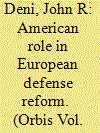

|
|
|
|
|
| Publication |
2012.
|
| Summary/Abstract |
In order to influence the direction and outcomes of defense reforms occurring across Europe, the United States needs to refocus its military-to-military engagement programs with its European allies. Instead of seeking to build partner capacity among the newest NATO members or aspirants, Washington will be better served by maintaining and strengthening interoperability with those allies that are adaptive and innovative, deployable and expeditionary, and capable of full spectrum operations-that is, allies such as France, Italy, Germany, the Netherlands and the United Kingdom. This finding is based upon what Washington itself sees as the future of conflict and the kinds of coalition partner skills and abilities the United States will need to counter post-International Security Assistance Force International Security Assistance Force (ISAF) threats to U.S. and collective security. Given budget and force structure cuts facing the United States as well, the American military cannot afford to waste its limited security cooperation resources.
|
|
|
|
|
|
|
|
|
|
|
|
|
|
|
|
| 2 |
ID:
187305
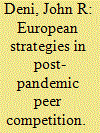

|
|
|
|
|
| Summary/Abstract |
The recent reconceptualization of national and/or defense strategies, hangovers from the sovereign debt crisis, and the impact of the pandemic-induced recession in four of the most powerful European countries – France, Germany, Italy, and the United Kingdom – will have profound implications for the United States. Through Republican and Democratic administrations, most American political leaders, experts in academia and think tanks, and other opinion leaders in the media and elsewhere have consistently held that Europe is vital to American national security. This is particularly true during an era of great power competition, as the United States works to prevent China’s authoritarian governance system and its statist economic model from becoming dominant. Given recent changes in the grand strategies of America’s most important European allies and their shifting abilities to fulfill those strategies, Washington will have an increasingly difficult time fulfilling its own goals and objectives. American strategy relies on European allies for competition with near-peers as well as defense of the global commons and projection of hard and soft power overseas to favorably influence events. Shifting capabilities, capacity, and will within Europe – all framed within evolving European strategies – will make it difficult for Washington to rely on its allies.
|
|
|
|
|
|
|
|
|
|
|
|
|
|
|
|
| 3 |
ID:
170143


|
|
|
| 4 |
ID:
131440
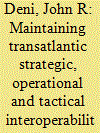

|
|
|
|
|
| Publication |
2014.
|
| Summary/Abstract |
With the end of major combat operations in Afghanistan, how will the North Atlantic alliance maintain the unprecedented levels of interoperability developed over the last decade? One of the most effective means of building and maintaining interoperability-the forward-based presence of US military forces in Europe- has shrunk significantly over the last 25 years and is likely to shrink further in the coming years, meaning it will become increasingly difficult for American and European military forces to operate side by side. Nevertheless, the United States continues to look to its allies in NATO as the primary partners in maintaining and promoting common interests around the globe. Additionally, Washington seems more committed than ever to wielding force in a coalition context. In order to help remedy this seeming incongruity, Washington announced in early 2012 a plan to deploy rotationally several hundred troops from the United States to Germany for periodic exercises with European partners and allies. However, it remains unclear whether a rotational model will be sufficient to generate the level of interoperability necessary for US forces and those of its most capable European allies to work seamlessly across the range of military operations. The loss of tactical and operational interoperability threatens transatlantic strategic interoperability, and therefore risks decoupling European and American security policy. To mitigate these challenges, the article discusses several policy steps the United States should consider.
|
|
|
|
|
|
|
|
|
|
|
|
|
|
|
|
| 5 |
ID:
061078
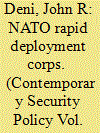

|
|
|
| 6 |
ID:
136492


|
|
|
|
|
| Summary/Abstract |
NATO is seeing something of a rebirth manifested by the Wales summit in September 2014. The summit did not fix all NATO’s woes, but it did address a number of them, especially the reconfigured security situation in Europe. However, it remains unclear how NATO can add to its already full plate, especially during a time of personnel cuts and zero-growth budgets.
|
|
|
|
|
|
|
|
|
|
|
|
|
|
|
|
| 7 |
ID:
144766
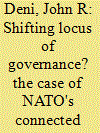

|
|
|
|
|
| Summary/Abstract |
In early 2012, NATO's then-Secretary General, Anders Fogh Rasmussen, unveiled the Connected Forces Initiative (CFI), an effort designed to increase allied interoperability and readiness. Through three lines of effort – training and education, exercises, and better use of technology – the CFI is intended to help the alliance maintain the operational and tactical interoperability it developed in Afghanistan. At first glance, the CFI appears to represent an example of the claims of some neo-institutionalist scholars that there is a shift in the locus of governance from member states to NATO. However, this article takes a deeper look and concludes that in fact the locus of security governance is not shifting, at least not in this instance. Member states of the alliance retain several means of controlling and influencing NATO, thereby preventing it from developing a significant degree of autonomy, in contrast to the European Union or United Nations.
|
|
|
|
|
|
|
|
|
|
|
|
|
|
|
|
| 8 |
ID:
148073


|
|
|
|
|
| Summary/Abstract |
According to the 2015 National Security Strategy, the United States continues to rely on Europe as its most likely, most capable military partner for dealing with the most vexing security challenges. However, the conventional wisdom in Washington holds that European allies are not terribly capable militarily or very willing to use force. So why would the United States rely on such lax partners? In fact, the evidence on European defense spending, capabilities, and willingness is decidedly mixed, with many positive trends among the negative ones. To build on the positive, the United States can bring to the table assets and resources necessary to facilitate the transatlantic partnership before it needs to be exercised.
|
|
|
|
|
|
|
|
|
|
|
|
|
|
|
|
| 9 |
ID:
131628


|
|
|
|
|
|
|
|